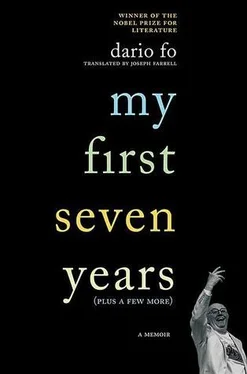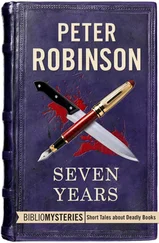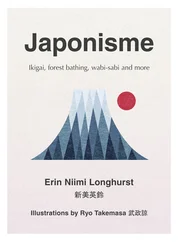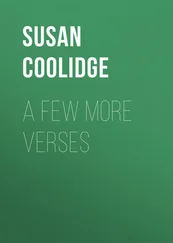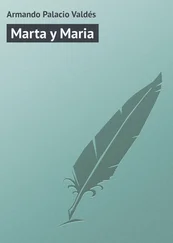Dario Fo - My First Seven Years (Plus a Few More)
Здесь есть возможность читать онлайн «Dario Fo - My First Seven Years (Plus a Few More)» весь текст электронной книги совершенно бесплатно (целиком полную версию без сокращений). В некоторых случаях можно слушать аудио, скачать через торрент в формате fb2 и присутствует краткое содержание. Год выпуска: 0101, Издательство: St. Martin's Press, Жанр: Биографии и Мемуары, на английском языке. Описание произведения, (предисловие) а так же отзывы посетителей доступны на портале библиотеки ЛибКат.
- Название:My First Seven Years (Plus a Few More)
- Автор:
- Издательство:St. Martin's Press
- Жанр:
- Год:0101
- ISBN:нет данных
- Рейтинг книги:3 / 5. Голосов: 1
-
Избранное:Добавить в избранное
- Отзывы:
-
Ваша оценка:
- 60
- 1
- 2
- 3
- 4
- 5
My First Seven Years (Plus a Few More): краткое содержание, описание и аннотация
Предлагаем к чтению аннотацию, описание, краткое содержание или предисловие (зависит от того, что написал сам автор книги «My First Seven Years (Plus a Few More)»). Если вы не нашли необходимую информацию о книге — напишите в комментариях, мы постараемся отыскать её.
My First Seven Years In a series of colorful vignettes, Fo draws us into a remarkable early life filled with characters and anecdotes that would become the inspiration for his own creative genius.
My First Seven Years (Plus a Few More) — читать онлайн бесплатно полную книгу (весь текст) целиком
Ниже представлен текст книги, разбитый по страницам. Система сохранения места последней прочитанной страницы, позволяет с удобством читать онлайн бесплатно книгу «My First Seven Years (Plus a Few More)», без необходимости каждый раз заново искать на чём Вы остановились. Поставьте закладку, и сможете в любой момент перейти на страницу, на которой закончили чтение.
Интервал:
Закладка:
‘So are you saying that we should stop praying weed-killers and pesticides … should we stand by and watch these vermin destroy our crops?’
‘For God’s sake, no. Chemistry and progress are sacred things, but don’t trust anybody straight off, as though you were blind moles: get the information! Stop holding on to the damn idea that all that’s important is to secure your own advantage, and the hell with whatever comes after. Look, it’s like hitting out when you’re playing lippa, the kind of rounders game they play in these parts. You strike, the lippa flies through the air but there’s always the risk it will come down slap-bang in somebody’s eye. Sure, not everything that brings death is necessarily negative. My grandmother treated her sciatica by having herself bitten on the buttocks by a poisonous snake, and incredibly enough she was completely cured. But her sister was stung by a wasp and died. In nature, everything can be overturned, everything has its double, negative or positive. You can never say: “I do not know the effect of this medicine, nor do I want to know.” No, you’ve got to know, you’ve got to get the information, you’ve got to learn; otherwise, this great mother Nature will become as ferocious and vindictive as an ordinary god, and strangle us all in our cradles … or will poison us while she breast-feeds us at her great tits!’
I stood close by, listening, always fascinated by how my grandfather managed to express such important concepts with such simplicity. As I observed his gestures, I imprinted each lesson of his in my brain, and there came to my mind that stupendous maxim by Montesquieu: ‘An erudite expert is one who uses complex terms and expressions to communicate nothing at all.’ My grandfather was exactly the opposite.
The former students of the Faculty of Agrarian Studies, all now graduated and well advanced in the practice of their profession, often came to visit him. Punctually, every Friday, he received a visit from the parish priest of Torreberetti. He and the priest would take a seat in the wisteria bower, and their conversation was never less than animated. Once I heard my grandfather roar: ‘The fact is that if you are to survive, my dear Roman and Apostolic Catholics, you need all the rites of holy religion, starting with confession which frees you of all guilt: a touch of repentance and you’re on your way again. If you’ve got problems, you get down on your knees and say a prayer to Our Lord, the saints, or Our Lady to come and fix things up for you. We atheists, on the other hand, have no saint to attach ourselves to. For our guilt, we can only turn to our consciences. If we’ve got problems, we’ve only got our reason to rely on!’
Soon after, as he was waving goodbye to the parish priest, who was now in the distance, he commented: ‘I’ll have to watch out I don’t go too far with him. What’s going to happen is that one fine day he’ll start having doubts, pull off his vestments and turn atheist. Then I’ll have to go and take his place in the parish.’
Three years later, my grandfather died. There was a huge crowd at his funeral, many from the farms round about. Some came from the other side of the River Po. They were all on bicycles. Since the Sartirana cemetery was on the other side of the railway line and the canal, they followed the hearse, as was the custom with every funeral, cycling slowly. It was not considered respectful to follow by motorbike. A procession with so many bicycles swarming silently over the plain was, to say the least, a bit surreal!
I pedalled close to the Torreberetti priest, who was not wearing clerical garb. The professor from Alessandria had been asked to say a few words of farewell at the grave-side.
One sentence has remained alive in my memory: ‘At the death of a peasant who knew his own land and who knew the history of the men who worked that land, at the death of a wise man who knew how to read the moon and sun, the winds and the flight of the birds, as Bristìn did, it is not only one man who dies: it is a whole library which is burned down.’
CHAPTER 26. Waiting for Picasso
I was in my second year at the Brera Academy and had chosen the course on frescos with Achille Funi, an extraordinary teacher. Every so often, Carrà, a highly likable as well as talented man, would take the class. In the post-war period, all the academic conventions and rules had been set aside: any student was free to go to any class and follow an entire lesson without fear of being asked to leave. So it was that every so often I would turn up in the principal lecture hall where the sculpture instructor was Marino Marini. On another occasion, I managed to get into the studio of Giacomo Manzoni, better known as Manzù, to fashion clay on the lathe, to help in the operations of casting plaster and fusing moulds. There was no timetable: it was permitted to carry on working even after six o’clock in the evening … not in all classrooms, obviously. In Perspective, that is in the School of Stage Design, it was possible to enter even after dinner, right up until night-time. The director of this genuinely free academy was Aldo Carpi, recently returned in poor physical condition from the Matthausen labour camp. He had always shown himself to be a man of extraordinary cultural and civil openness, a true example of what is meant by ‘free ideas’.
My companions at the academy included Morlotti, Peverelli, Alik Cavaliere, Bobo Piccoli, Parzini, all of whom would make a certain name for themselves in succeeding years. I was not aware of it, but I was living in a really extraordinary and unrepeatable moment of our history, from both the political and cultural point of view. Among the trattorias and osterias of Via Fiori Chiari and Via Fiori Scuri, interspersed with the occasional brothel, there were colourful shops and bars like the Jamaica and Le Sorelle Pirovini. At any moment you could run into people of great importance: writers, theatre and cinema directors who later became famous. I often found myself seated at the same table as them in the Fiori Chiari, eating plates of badly cooked and badly flavoured pasta. But nobody minded. The only complainants were our stomachs.
We talked about everything, about the political situation, about stage sets, about the Italian and foreign books which we were finally able to read after twenty years of Fascist censorship. We did not have much money, often we had to tighten our belts or live on what we could borrow, but I have never lived in such a climate of carefree rumbustiousness as in those days and at that level.
* * *
Often, while we were in the Jamaica having a sandwich, my friends would encourage me to tell them some new tale, and there was no escape, even when I was not in the mood. By now I had put together a considerable repertoire, mainly of pieces with some reference to current affairs, but also of caricatures of our professors and great teachers whose mythical obsessions, generosity and meanness were well known to us. One of the most frequently requested satires was on Carrà. I invited them to imagine the Master intent on painting one of his famous beaches with its brightly coloured cabins, and in the background the sea and a bather running along the waterline pursued by a playful dog jumping in the air. Carrà scratches the figure of the dog off the canvas three times: he cannot get it right. Finally he asks his wife to act as model: ‘Get into the right pose, on all fours, please … that’s it … just like that … now make a gesture of leaping … try harder … paws up … yelp a little. Pity you don’t have a tail.’ Obviously, in this case, the situation was ironical and had little to do with reality, unlike in others, such as the one which satirised the behaviour of De Chirico. The most requested sketch was the one in which I performed dialogues between various characters, the merchant who begs the Master to reproduce his most famous masterpieces from his metaphysical period. De Chirico fends him off, but sets to work with the help of a pupil once he has fixed the price. Here was the Master of metaphysics seized by a creative impulse, painting at top speed and reproducing the same subject on four different canvases. As though he were on an assembly line, he is overwhelmed by his own demonic rhythm and slaps paint over the pupil and the merchant who is standing by, desperate for the ‘merchandise’. At this point, as he evaluates the result, the Master decides to introduce into the four copies some variants on the original, the famous piazza in Ferrara with the castle, the towers and the heightened perspective sloping down to the sea. ‘Here we are, I’ll add an extra tower, and instead of the grey sea, I’ll put in a nice green, stormy sea. I could trick this one out with some little pyramids in the background and a yacht out at sea. On this one, I could do a female nude: Dido Abandoned. On the sea, we could have a ship sinking beneath the waves.’ The whole thing, obviously, recounted with mime gestures to suggest the frenzy of his painting.
Читать дальшеИнтервал:
Закладка:
Похожие книги на «My First Seven Years (Plus a Few More)»
Представляем Вашему вниманию похожие книги на «My First Seven Years (Plus a Few More)» списком для выбора. Мы отобрали схожую по названию и смыслу литературу в надежде предоставить читателям больше вариантов отыскать новые, интересные, ещё непрочитанные произведения.
Обсуждение, отзывы о книге «My First Seven Years (Plus a Few More)» и просто собственные мнения читателей. Оставьте ваши комментарии, напишите, что Вы думаете о произведении, его смысле или главных героях. Укажите что конкретно понравилось, а что нет, и почему Вы так считаете.
